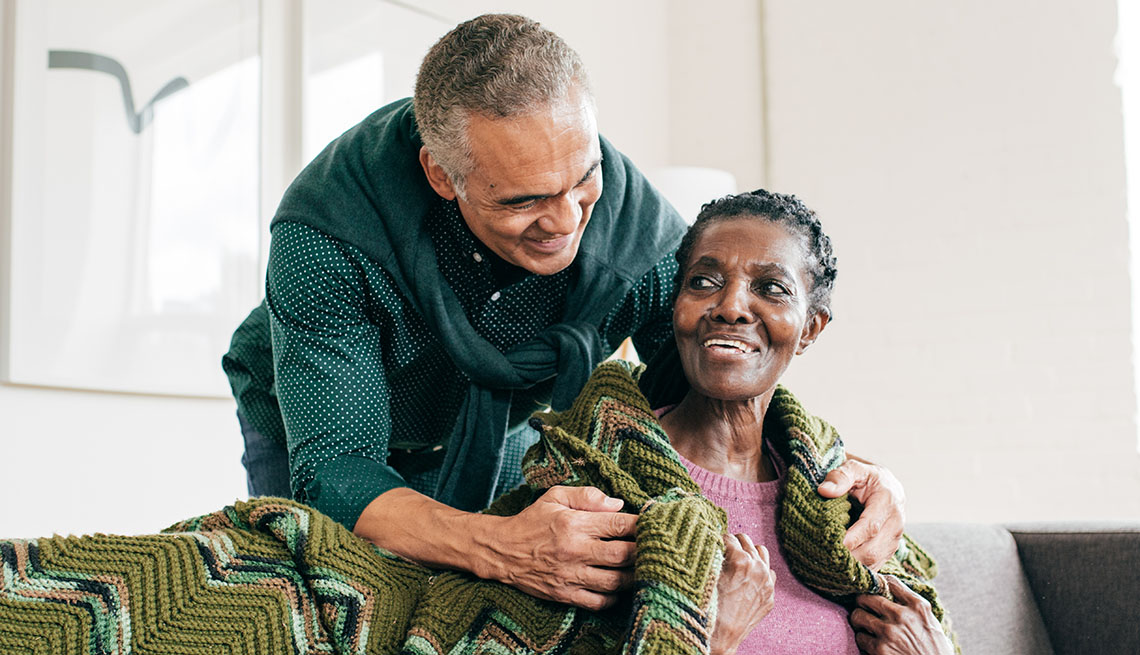
11 ways to manage sundown syndrome
- Select a language for the TTS:
- UK English Female
- UK English Male
- US English Female
- US English Male
- Australian Female
- Australian Male
- Language selected: (auto detect) - EN
Play all audios:

6. ADJUST LIGHT EXPOSURE Some experts theorize that our hormones and body clocks are regulated by exposure to light, and too little exposure throws us off. If adequate exposure to direct
sunlight isn’t possible, try a light box and use bright lights in the room. As it gets dark outside, increase indoor and even outdoor lighting. In the winter, when days got shorter, I
would often turn on the bright back porch lights outside our dining-room window, which helped prevent Dad from thinking it was already bedtime. 7. PLAY MUSIC AND CALMING SOUNDS We used
music throughout the day for Daddy — instrumental music as he woke up, sing-along favorites or show tunes to activate him, and calming music when sundowning set in. I recommend trying solo
piano or classical guitar, or creating a “relaxation” or “spa music” channel on a music app such as Pandora, Spotify or Amazon Prime Music. If Dad got anxious at sundown, my sister and I
started singing his favorite songs and he would join in — a great diversion. Playing nature sounds like rain or ocean waves all night, or just white noise, helped him fall asleep and slumber
longer. 8. USE ESSENTIAL OILS Lavender, rose, ylang-ylang, chamomile, blue tansy, frankincense and other essential oils can be soothing. If you want to encourage waking up and staying
active during the day, try bergamot, jasmine, peppermint, rosemary or citruses such as grapefruit, lemon or orange. Test which scents your loved one responds to. Essential oils also can be
used in various ways, including for aromatherapy. (We used lavender oil in a diffuser for Dad, but you can also use it to scent a cotton ball, or mix it with water and spray it in the air.)
Consult with a doctor or other professional to ensure you are using essential oils safely, whether topically or as aromatherapy. They can be potent, so be sure to use appropriate amounts
and dilutions. 9. GIVE HEALING TOUCH Never underestimate the value of a hand or foot massage to relax tense muscles and increase feel-good hormones. For example, when Dad was at the
height of sundowning, we prepared a warm footbath with herbs and essential oils and soaked and massaged his feet about an hour before his sundowning generally started, which eased him
through the transition incredibly well. He always loved having his head rubbed and scratched, so doing that immediately calmed him. He also got a professional massage once a week, which
helped on an ongoing basis. A loving hug or holding hands can be physically calming and emotionally reassuring for your loved one, breaking the cycle of anxiety. 10. TRY COMPLEMENTARY
MEDICINE For example, traditional Chinese medicine (TCM) involves acupuncture, Tui na massage, Chinese medicinal herbs and other techniques. Acupuncture has been used to treat anxiety and
depression for many generations and is increasingly being accepted by Western medicine. I started taking Dad for acupuncture to help with grief, depression and anxiety and was pleased with
how it relaxed him; he continued with TCM for the last five years of his life. The sessions would start with a short Tui na massage to calm him (very important), and he generally slept
through the treatment. Because his primary sundowners behaviors were anxiety-based, the acupuncture and TCM medicinal herbs his doctor prescribed helped ease them. Talk with your loved one’s
doctor about this option, and find a traditional Chinese medicine doctor who understands dementia. 11. USE HERBS, SUPPLEMENTS AND MEDICATIONS WISELY Ask the doctor about medications that
might help with symptoms, such as antianxiety drugs and antidepressants. Be sure to ask about and monitor possible side effects; for some people with dementia, sedating drugs can cause the
opposite effect (this happened to my dad). A geriatric psychiatrist is an excellent resource. Also ask about herbs and supplements, such as lemon balm, valerian, chamomile, kava and holy
basil. There are many supplements that claim to be calming and stress reducing, including melatonin, magnesium, and B, C and E vitamins. Some research studies have indicated that taking
melatonin at night can lessen sundowners behaviors. Ask your loved one’s primary doctor or dementia-focused practitioner about the use and dosage of melatonin and other supplements. Managing
sundown syndrome requires creativity, flexibility, empathy and strong observational skills as we try to determine what triggers our loved ones and how to address the behaviors. No two
people with dementia are exactly alike, so be prepared to test different approaches and treatments. Some may not work, but others will. Successes might be temporary or intermittent. But even
a little bit of success can greatly ease your loved one’s anxieties, as well as your own stress. _Editor’s note: This column, originally published in May 2017, has been updated with new
information and to reflect the death of Amy’s father._
